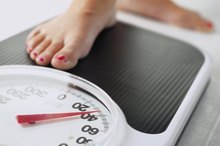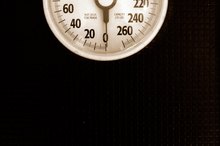How to Calculate the Time to Lose 80 lbs.
Weight loss is based on a mathematical formula that determines how many calories you can eat in order to lose 1 lb. Figuring how much time it takes to lose a specified amount of weight depends on a number of factors. When it comes to weight loss, slow and steady is the most effective approach. Losing weight too fast can put you at risk for medical complications and may make it difficult to keep the weight off. Talk to your primary care physician about your weight and safe ways to lose excess pounds.
Write down the food you eat in a diary and total the calories at the end of the day.
How to Lose 15 Pounds in One Month
Learn More
Calculate the number of calories you need to burn to maintain your current weight. To do this, multiply your weight times 15 if you do not exercise or 17 if you are active. For example, a 160-lb. woman who is inactive needs 2,400 calories to maintain her current weight but an active 160-lb. woman needs 2,720 calories per day.
- Weight loss is based on a mathematical formula that determines how many calories you can eat in order to lose 1 lb.
- To do this, multiply your weight times 15 if you do not exercise or 17 if you are active.
Subtract the number of calories you eat each day from the total number your body burns. Multiply this total by 7 to determine how many extra calories you burn each week. For instance, if you burn 1,000 calories each day, your total for the week will be 7,000 calories.
How Much Weight Can I Lose in 3 Weeks?
Learn More
Divide the total extra calories you burn in a week by 3,500. You must burn 3,500 calories to lose 1 lb. For example, if you burn 7,000 calories weekly, you will lose 2 lbs. every seven days.
- Subtract the number of calories you eat each day from the total number your body burns.
- Divide the total extra calories you burn in a week by 3,500.
Divide 80 by the number of pounds you lose each week to give you an estimate of how many weeks it will take to reach your goal. At 2 lbs. a week, you will lose 80 lbs. in 10 months.
Tips
Two pounds a week is a safe weight loss rate, according to the MayoClinic.com.
Warnings
The number of calories you burn must be higher then the number you eat to lose weight.
Related Articles
References
- MayoClinic.com; Counting calories: Get Back to Weight-Loss Basics; Mayo Clinic staff; Dec. 2009
- Centers for Disease Control and Prevention; Balancing Calories; 2011
- A new predictive equation for resting energy expenditure in healthy individuals - PubMed
- Estimation of energy expenditure using prediction equations in overweight and obese adults: a systematic review - PubMed
- Validity of predictive equations to estimate RMR in females with varying BMI - PubMed
- Appendix 2. Estimated Calorie Needs per Day, by Age, Sex, and Physical Activity Level - 2015-2020 Dietary Guidelines | health.gov
- Protein intake and energy balance - PubMed
- Increased Dietary Protein as a Dietary Strategy to Prevent and/or Treat Obesity
- Effect of protein overfeeding on energy expenditure measured in a metabolic chamber - PubMed
- Dietary Protein and Energy Balance in Relation to Obesity and Co-morbidities - PubMed
- Effect of protein overfeeding on energy expenditure measured in a metabolic chamber - PubMed
- Presence or absence of carbohydrates and the proportion of fat in a high-protein diet affect appetite suppression but not energy expenditure in normal-weight human subjects fed in energy balance - PubMed
- Gluconeogenesis and energy expenditure after a high-protein, carbohydrate-free diet - PubMed
- A high-protein diet for reducing body fat: mechanisms and possible caveats
- A high-protein diet induces sustained reductions in appetite, ad libitum caloric intake, and body weight despite compensatory changes in diurnal plasma leptin and ghrelin concentrations - PubMed
- The effects of consuming frequent, higher protein meals on appetite and satiety during weight loss in overweight/obese men - PubMed
- Dietary Strategies for Weight Loss Maintenance - PubMed
- Dietary protein - its role in satiety, energetics, weight loss and health - PubMed
- High Compared with Moderate Protein Intake Reduces Adaptive Thermogenesis and Induces a Negative Energy Balance during Long-term Weight-Loss Maintenance in Participants with Prediabetes in the Postobese State: A PREVIEW Study - PubMed
- Effects of food form and timing of ingestion on appetite and energy intake in lean young adults and in young adults with obesity - PubMed
- Effects of fruit and vegetable, consumed in solid vs beverage forms, on acute and chronic appetitive responses in lean and obese adults - PubMed
- Sugar-sweetened beverages and weight gain in children and adults: a systematic review and meta-analysis - PubMed
- Resolved: there is sufficient scientific evidence that decreasing sugar-sweetened beverage consumption will reduce the prevalence of obesity and obesity-related diseases - PubMed
- Adverse metabolic effects of dietary fructose: results from the recent epidemiological, clinical, and mechanistic studies - PubMed
- Water-induced thermogenesis - PubMed
- Water drinking induces thermogenesis through osmosensitive mechanisms - PubMed
- Water-induced thermogenesis and fat oxidation: a reassessment - PubMed
- Immediate pre-meal water ingestion decreases voluntary food intake in lean young males - PubMed
- Water consumption increases weight loss during a hypocaloric diet intervention in middle-aged and older adults - PubMed
- Tea catechin and caffeine activate brown adipose tissue and increase cold-induced thermogenic capacity in humans - PubMed
- Caffeine enhances activity thermogenesis and energy expenditure in rats - PubMed
- The effects of caffeine intake on weight loss: a systematic review and dos-response meta-analysis of randomized controlled trials - PubMed
- Caffeine intake is related to successful weight loss maintenance - PubMed
- Preserving Healthy Muscle during Weight Loss
- Exercise acts as a drug; the pharmacological benefits of exercise - PubMed
- The essential role of exercise in the management of type 2 diabetes - PubMed
- A Systematic Review of Exercise Systematic Reviews in the Cancer Literature (2005-2017) - PubMed
- Benefits of exercise training on cardiovascular dysfunction: molecular and integrative - PubMed
- Exercise in the treatment of clinical anxiety in general practice - a systematic review and meta-analysis - PubMed
- The effects of a low-carbohydrate diet on appetite: A randomized controlled trial - PubMed
- Effects of low-carbohydrate and low-fat diets: a randomized trial - PubMed
- Effects of low-carbohydrate and low-fat diets: a randomized trial - PubMed
- Dietary Intervention for Overweight and Obese Adults: Comparison of Low-Carbohydrate and Low-Fat Diets. A Meta-Analysis - PubMed
- The Effects of a Low-Carbohydrate Diet vs. a Low-Fat Diet on Novel Cardiovascular Risk Factors: A Randomized Controlled Trial
- The Effect of Low-Carbohydrate Diet on Glycemic Control in Patients with Type 2 Diabetes Mellitus - PubMed
Writer Bio
Writing since 1999, Darla Ferrara is an award-winning author who specializes in health, diet, fitness and computer technology. She has been published in "Mezzo Magazine" and Diet Spotlight, as well as various online magazines. Ferrara studied biology and emergency medical technology at the University of Nebraska and Southeast Community College.









